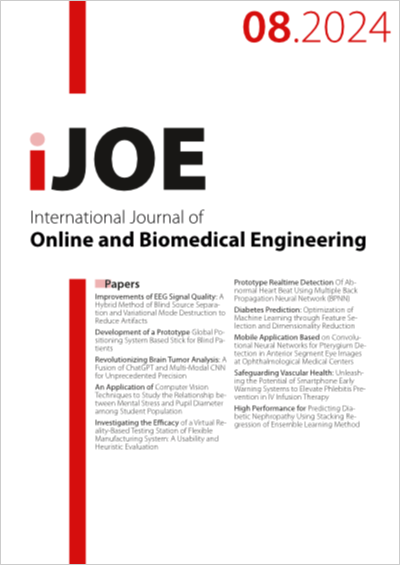High Performance for Predicting Diabetic Nephropathy Using Stacking Regression of Ensemble Learning Method
DOI:
https://doi.org/10.3991/ijoe.v20i08.48387Keywords:
Diabetic Nephropathy, ensemble method, machine learning, stack regressionAbstract
Diabetes may lead to several problems, one of the most prevalent and deadly of which is diabetic nephropathy. Therefore, the condition represents a significant threat to one’s health since it has the potential to cause irreversible harm to the kidneys’ ability to operate. A significant portion of the research that is being conducted now is focused on determining how accurately diabetic people may be predicted to develop kidney illness. Considering this, the research suggests a regression stacking approach for predicting albumin levels. These albumin values will serve as a reference for the incidence of diabetic nephropathy disease. They will be derived from the medical records of patients. The utilization of stacking regression from three different ensemble approaches, using Random Forest and CatBoost regressors, while the Huber algorithm is used as a meta-learner. The accuracy with which the combination of parameters that are employed is determined is a significant factor. It contributes to the high degree of performance that the ensemble approach achieves. Therefore, in this investigation, a grid search was carried out to tune the hyperparameters of both regressor models. We evaluated the performance of the proposed model using accuracy, MAPE, RMSE, and MSE values. The experimental findings demonstrate great performance. Three selected variables including quantitative UACR, semi-quantitative UACR, and urinary creatinine, achieved high performance. Overall, the performance obtained an accuracy rate of more than 98% with an error rate (MAPE, RMSE, and MSE values) of less than 1%. In conclusion, the stack regressor model can be implemented to predict diabetic nephropathy using clinical datasets.
Downloads
Published
How to Cite
Issue
Section
License
Copyright (c) 2024 Assoc. Prof. Dr. Lailil Muflikhah, S.Kom., M.Sc., Amira Ghina Nurfansepta, Dr. Eng. Fitra A. Bachtiar, S.T., M.Eng., Dr. Dian Eka Ratnawati, S.Si., M.Kom.

This work is licensed under a Creative Commons Attribution 4.0 International License.



